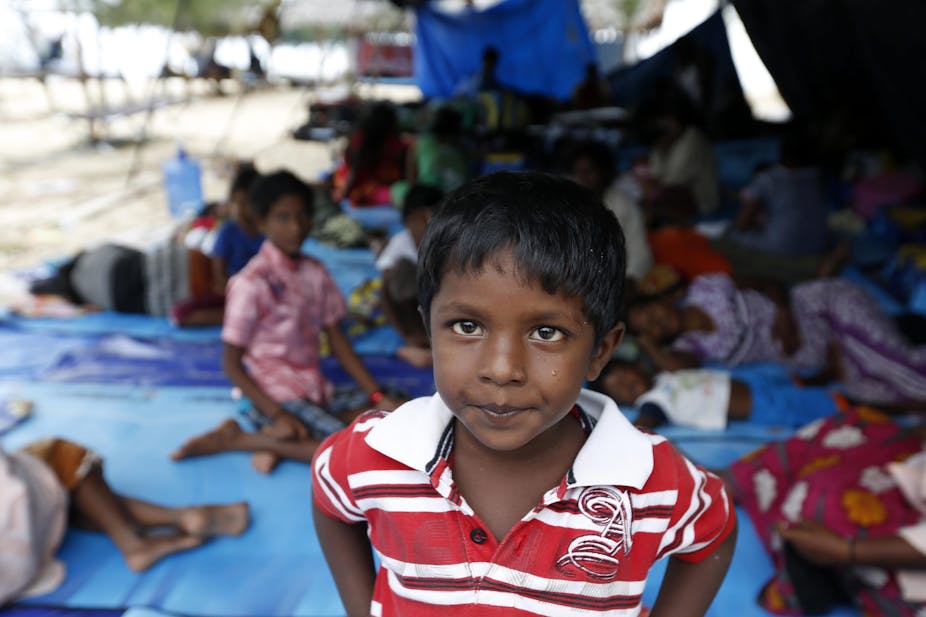
Among more than 3,700 child refugees in Indonesia, close to 500 are unaccompanied minors.
Many have no access to formal education and health care. They have to go through the procedures to process their asylum claims without a guardian or legal aid to help them.
Only a few countries, such as Australia and the United States, accept child refugees without guardians. So most unaccompanied child refugees have to wait in transit countries until they are 18 years old before they can be resettled.
Because of these circumstances, these children are considered the most vulnerable among the refugees. The Indonesian government should do more to protect unaccompanied child refugees in Indonesia.
In recent years a number of NGOs have provided services for child refugees. The government should consider partnering these organisations to uphold child refugees’ rights to protection.
Unaccompanied minors in Indonesia
Indonesia’s 2016 refugee decree makes explicit the duty to rescue, evacuate, monitor, register and accommodate refugees. For example, if asylum seekers reach Indonesian waters by boat, the government must rescue them.
However, none of the decree’s provisions provides specific rights for refugees post-evacuation nor does it specify the rights of child refugees.
As a result, many asylum seekers and refugees in Indonesia live with very little means while waiting to be resettled, as they are prohibited from working and earning an income. Child refugees face the same hardship and, worse, they are prone to being abused.
In Indonesia, the Law on Child Protection Instrument (Law No. 35/2014) protects children. But it does not extend to child refugees because of their immigration status.
While the refugee decree and child protection law in Indonesia do not provide specific rights for child refugees, the United Nations Convention on the Rights of the Child (CRoC) does. Indonesia ratified the convention in 1990 through a presidential decree that provides a specialised obligation on the subject matter.
Article 22(1) of the CRoC stipulates that child refugees are entitled to:
receive appropriate protection and humanitarian assistance in the enjoyment of applicable rights set forth in the present Convention and in other international human rights or humanitarian instruments.
The convention applies to both nationals and non-nationals. Further, the UN Committee on the Rights of the Child interprets that all of the convention’s provisions shall apply to children irrespective of their nationality, immigration status or statelessness and not limited to citizens of a state party.
What is urgently needed for unaccompanied child refugees is prompt appointment of guardians to provide legal advice in claiming the rights of the children in compliance with the principle of the “best interest of the child”.
For example, in the European Union, a legal guardian is appointed to represent the child in legal proceedings, take care of the child’s finances and promote the child’s well-being to the government. The guardian, therefore, should have expertise in childcare and is responsible for helping the children with the administrative and or judicial procedures of asylum claims until they turn 18.
The protection gap
Unaccompanied child refugees in Indonesia do not enjoy the rights they are entitled to under CRoC. In January 2017, 91 of 471 unaccompanied minors in total were detained by the immigration authorities.
The child refugee in detention faces worse conditions than children convicted of criminal activities. Convicted children in Indonesia are entitled to exclusive detention treatment at the Children Special Construction Agency (LPKA) or Juvenile Detention Centres (LAPAS) in cases where LPKA is absent. These centres provide them with formal education, skills training and coaching.
Due to their immigration status, child refugees are treated as adult refugees. They are kept in the same detention centres with unrelated adults.
This makes them prone to abusive treatment and sexual assault. Under Indonesian immigration policy they can be detained for up to ten years without any judicial review.
And instead of providing these children with guardianship and legal representation to “promote physical and psychological recovery” in detention, some immigration authorities have been involved in abusing children.
Partnering with NGOs for a rights-based treatment
In recent years, a number of NGOs in Indonesia have started to work on child refugee issues.
Some of them, such as Cisarua Refugee Learning Center and Roshan Learning, pay more attention to educational care and vocational training to provide children with soft skills. The Sunrise Refugee Learning Center of Sandya Institute in Jakarta offers various language, computer, arts, legal, cultural and entrepreneurial classes to refugees. At present, 15 of the total 75 registered students are underage children.
Others, like SUAKA and JRS, provide free legal assistance, but not solely to child refugees.
Church World Service, an NGO that has advocated for an alternative to detention, has been sheltering more than 80 unaccompanied minors in Indonesia.
The increasing attention from civil society organisations on the need for a rights-based treatment of unaccompanied refugee children is an opportunity for the Indonesian government to partner with them in fulfilling its human rights obligations to unaccompanied minors.
The UNHCR, in its Guidelines on Policies and Procedures in dealing with Unaccompanied Children Seeking Asylum, recommended that “an independent and formally accredited organisation be identified/established in each country, which will appoint a guardian or adviser as soon as the unaccompanied child is identified”.
Indonesia could delegate its responsibility to ensure protection for unaccompanied child refugees by partnering with NGOs that have been licensed under the Ministry of Law and Human Rights. Through this partnership, these NGOs could seek experienced legal professionals, provide them with necessary training in childcare and assign them as legal guardians.
In this way, Indonesia can meet some parts of its obligations and at the same time place the principle of the “best interest of the child” at the forefront of its refugee management by ensuring unaccompanied child refugees are treated according to humanitarian principles.
Dio Herdiawan Tobing, Research Associate at the ASEAN Studies Center, Universitas Gadjah Mada
Sumber asli artikel ini dari The Conversation. Baca artikel sumber.
